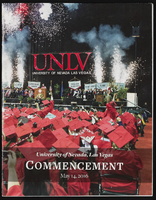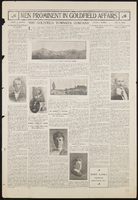Search the Special Collections and Archives Portal
Search Results

Meeting minutes for Consolidated Student Senate, University of Nevada, Las Vegas, November 7, 1978
Date
Archival Collection
Description
Text
Woodrow Wilson Photograph Collection
Identifier
Abstract
The Woodrow Wilson Photograph Collection consists of black-and-white photographic prints and negatives. The images depict black elected government leaders attending the first Conference of Black Elected Officials held in Washington, D.C. in September 1969. Of particular interest are images of Nevada's first black state legislator, Woodrow Wilson; Georgia state representative, Julian Bond; and President Richard Nixon.
Archival Collection
J. Ross Clark Scrapbook
Identifier
Abstract
The J. Ross Clark Scrapbook dates from approximately 1897 to 1972 and consists of newspaper clippings collected by his wife, Miriam Evans Clark. The clippings relate to professional events in the lives of J. Ross Clark and his brother, Senator William A. Clark. A small number of the clippings refer to births, marriages, and deaths in Miriam Evans and J. Ross Clark's families. Also included are documents written by J. Ross Clark's grand-niece, Dorothy Murdock Dunkley, that offer additional information about the Clark and associated families.
Archival Collection

Transcript of interview with Lucille Down by James Hanson, February 21, 1972
Date
Archival Collection
Description
On February 21, 1972, James Hanson interviewed Mrs. Lucille Down (born December 14th, 1911 in Wellington, Kansas) in her home in Las Vegas, Nevada. The interview covers the lives of Union Pacific Railroad workers, and local education at schools such as the Las Vegas Grammar School and Las Vegas High School. Lucille discusses her first job, which was at the Southern Nevada Telephone Company. She also mentions having a swamp cooler attached to her family home. She concludes this interview with recollections on the social, recreational, religious and economic, changes that contributed to the development and growth of Las Vegas, Nevada.
Text
Dorothy Dorothy Papers
Identifier
Abstract
The Dorothy Dorothy papers (approximately 1913-1986) document the life of singer, songwriter, columnist, pilot, and farmer, Dorothy Dorothy. Materials contain genealogy records, correspondence, business and organizational records, local history, sheet music, artifacts, and two boxes of photographic prints. Also included are materials relating to her active involvement with animal rights campaigns.
Archival Collection

University of Nevada, Las Vegas (UNLV) Spring 2016 commencement program
Date
Archival Collection
Description
Commencement program from University of Nevada, Las Vegas Commencement Programs and Graduation Lists (UA-00115).
Text

Mike Montano interview, September 19, 2008: transcript
Date
Archival Collection
Description
First played in Las Vegas with Jack E. Leonard in 1960. Only worked at two hotels during his 24-year Las Vegas career - Flamingo and riviera
Text

Transcript of interview with Ray Christian by Russell L. Ellis, March 19, 1978
Date
Archival Collection
Description
On March 19, 1978, Russell L. Ellis interviewed former postal worker, Ray Christian (born 1927 in Las Vegas, Nevada). The two discuss Ray’s family history and his experiences as a Black man in early Las Vegas. Ray Christian compares the experiences of his childhood with that of his children in Las Vegas. The interview concludes with Christian expressing how Las Vegas has grown and that there are more opportunities available for his children to pursue.
Text

Sam Diaz interview, January 3, 2020: transcript
Date
Archival Collection
Description
Interviewed by Elsa Lopez. Sam Diaz was born in Los Angeles California, but was raised in Chula Vista, California. He is a police officer with the Las Vegas Metropolitan Police Department and has worked for LVMPD since 2007. He has served in in the U.S. Air Force Reserves since 2008, and served in the U.S. Air Force from 2001 to 2007. Diaz describes his multi-cultural upbringing and growing up in such close proximity to the U.S.-Mexico border. He describes his passion for serving which he had since a young age. He describes his incorporation within every community he has been a part of and talks about the ways he has worked to serve the Las Vegas community since moving here in 2007. He recounts the tragic night of 1 October, the mass shooting that occurred during the Route 91 Harvest music festival on October 1st, 2017 on the Las Vegas Strip. He talks about the various changes that happened within LVMPD since 1 October, and changes that he has seen in the Latinx community throughout the Las Vegas Valley. Diaz also describes the process of adopting two children and raising a multi-racial family with his wife in Las Vegas.
Text

